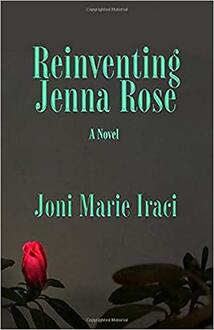Jenna Rose is a prisoner in her own home. Shut off from the world and abused by her parents, she sees an opportunity to escape across the country and takes it. Reinventing Jenna Rose is a story of overcoming trauma and taking control of one’s life. We meet Jenna, a lost seventeen-year-old, who is abandoned in her California home once again by her mother, Meghan. For fear of her father and his heinous gaze, Jenna escapes to New York City to find a grandmother she didn't know existed. Through her grandmother, Katherine, Jenna learns of generations of female suffering. Joni Marie Iraci tackles sexual abuse and neglect in this fast-paced novel to reveal that reclaiming one’s self after tragedy and controlling one’s identity is always possible. Jenna learns it is not just her who has dealt with abuse, but Katherine, too. Katherine carefully explains her connection to her guardian’s brother who took advantage of her, but due to the time period she was made to believe the abuse and that the consequences of it were her fault. Iraci uses this scenario to comment on the victim blaming nature of society, in which a child was assaulted yet forced to continue to care for the man who assaulted her. Though Katherine lost a part of herself, she built a successful life through her work and marriage in New York. As Jenna listens to her grandmother’s story, she realizes her “grandmother was…expelling it, probably for the first time. Tears were swimming around in my eyes; I loved her already,” (p. 55). Through this truth-telling, the two women find common ground in trauma and are able to move forward. The characterization of Jenna and the way she deals with her trauma is realistic; so realistic that, at times, perhaps it is a detriment to the pacing of the novel. Moments happen rapidly, relationships are formed and then lost, years pass by within a paragraph. Even so, when dealing with a character like Jenna who wants to repress her childhood and focus on her exciting new life in New York City, it makes sense that the world we see through her eyes is rapid and disjointed. She grew up with a lack of social skills making her relationships often one-sided, but that does not discount the love found within them. As Jenna refuses to reveal her past to those around her, it can be frustrating to the reader. However, this is realistic because those who have lived through this type of abuse or trauma may not want to talk about it openly, especially in the early stages of healing. Jenna is embarrassed, and through that we find her character believable and we are sympathetic as readers. Iraci shows us that the family we are born with can destroy us, yet it is often the family we choose that supports us. Jenna’s childhood is weighed down by her father’s disgusting mistreatment of her. He steals her innocence from her, which he argues was merely a part of his “art,” but Jenna gets her retribution in the end. As the story of her life continues, she takes control of her path. Her path is awkward, usually emphasized by the delivery of dialogue in which the language is overly-expository and stiff. Jenna tells a story about her childhood with dialogue that says, “Yeah, well, quirky was what Alan called me. He said it when he first noticed me picking the chipped paint from the wainscoting on my bedroom wall…Picking at the peeling paint made me feel like I was in control of something. A little scratch on the paint and down it would fall in pieces behind the bed and onto the pink carpet in that sickly pink room, which Alan decorated just for me” (p. 168). Often characters will speak for long blocks with very little importance, and years and relationships get fogged into the background, but isn’t that so true to life? After Jenna gets justice, she focuses on herself, seemingly signifying that the little things do not matter as much. Even though the second half of the novel is quick paced--which makes it difficult to sink into moments of Jenna’s life--we are able to see how life after trauma can get better with passing time. We can’t help but root for Jenna and her journey, and through her bravery and thoughtful relationships, we are excited to see what every twist in her life will bring her.
1 Comment
5/21/2020 04:14:05 pm
Thank you Glassworks for this thorough and thoughtful review. Stay tuned for my next novel. The manuscript is currrently in the hands of a prestigious literary agent. Fingers crossed.
Reply
Leave a Reply. |
Archives
April 2024
Categories
All
|
|
Glassworks is a publication of Rowan University's Master of Arts in Writing 260 Victoria Street • Glassboro, New Jersey 08028 glassworksmagazine@rowan.edu |
All Content on this Site (c) 2024 Glassworks
|


 RSS Feed
RSS Feed
